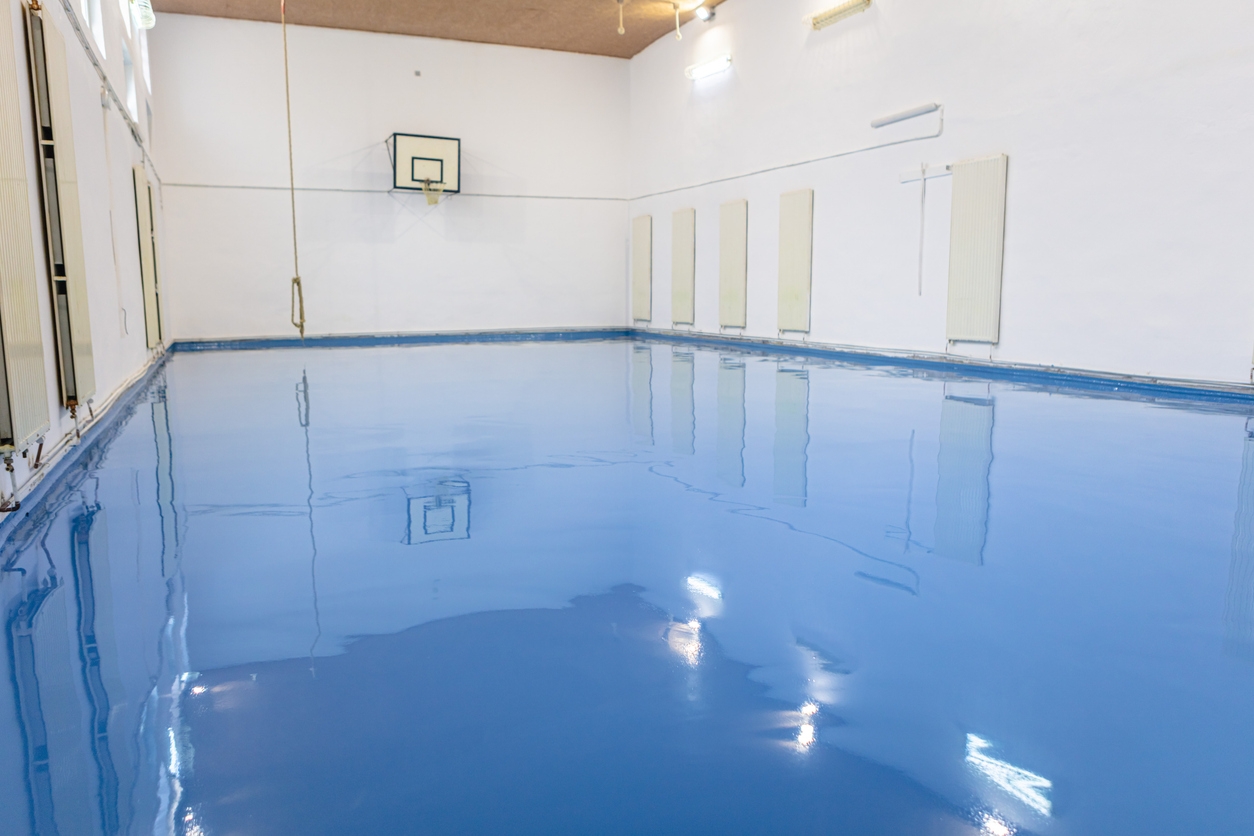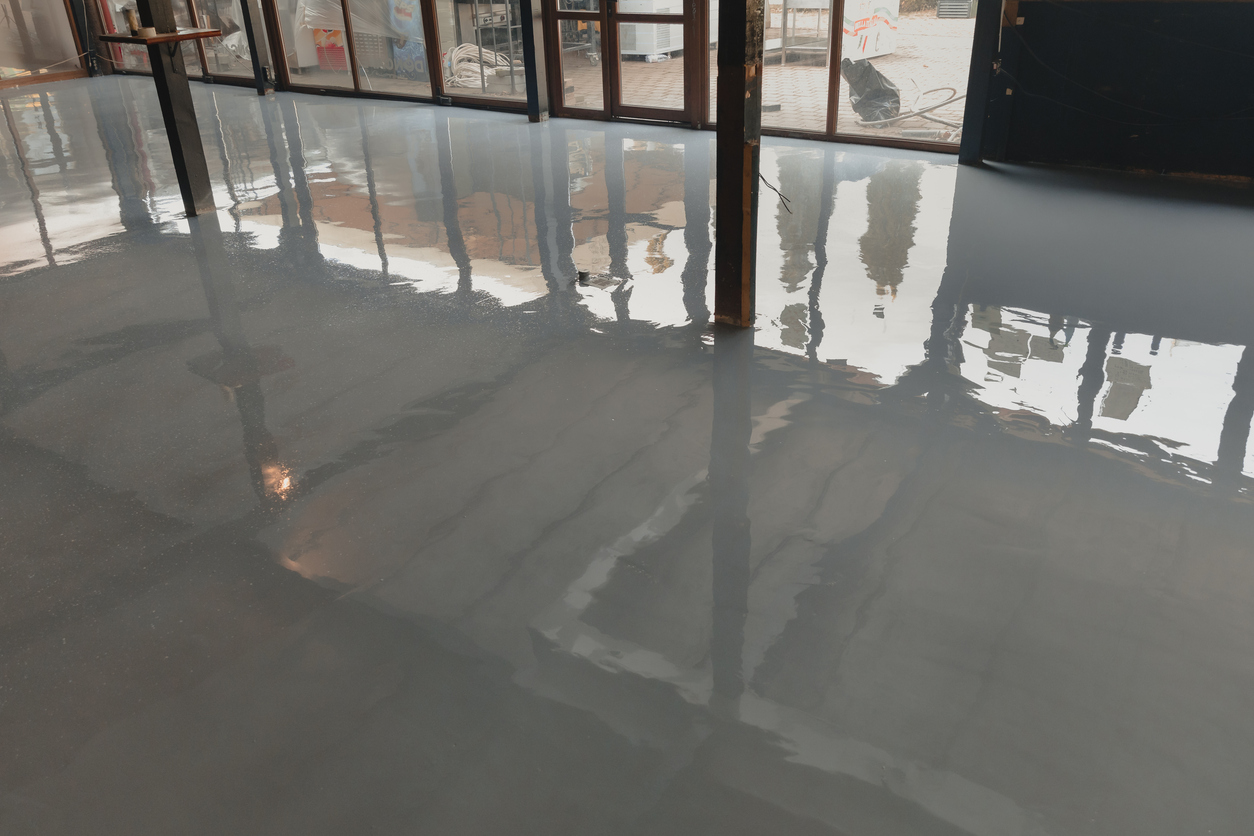Commercial buildings in the San Ramon, CA area usually receive much higher traffic than their residential counterparts. Commercial buildings often need frequent maintenance including exterior and interior painting. This is why their floors should have adequate protection with an appropriate coating material, depending on the usage or area.
Choosing the right floor coating is crucial for durability, safety, and aesthetics in commercial spaces. This article will explore the various types of coatings commonly used on commercial flooring from a professional painter’s perspective.
Epoxy coatings
Benefits of epoxy coatings
- Durability and resistance to wear and tear: Epoxy coatings provide a durable and resilient surface that can withstand heavy traffic and harsh conditions, making them ideal for areas subjected to regular use and mechanical stress.
- Chemical resistance and ease of cleaning: Many businesses use epoxy coatings to protect concrete floors in warehouses, enhancing their durability and making them easier to clean, which helps maintain a safer and more efficient working environment.
Common applications
- Warehouses: Epoxy coatings protect concrete floors in warehouses, enhancing their durability and making them easier to clean. This helps maintain a safer and more efficient working environment.
- Factories: In manufacturing settings, epoxy coatings provide a robust surface that can handle heavy machinery and foot traffic while also being resistant to spills and chemicals used in the production processes.
- Automotive service areas: Epoxy coatings are ideal for automotive workshops and service areas. They offer protection against oil, grease, and other automotive fluids while providing a clean and professional appearance.
Polyurethane coatings
Benefits of polyurethane coatings
1. Flexibility and resistance to abrasion
- Polyurethane coatings are known for their excellent flexibility, which allows them to absorb impacts without cracking or chipping. This element makes them highly durable and resistant to abrasion, extending the lifespan of the flooring.
2. UV stability and resistance to yellowing over time
- Unlike some other coatings, polyurethane has high UV stability. It means this coating resists degradation when exposed to sunlight. This prevents the coating from yellowing over time, maintaining the floor’s aesthetic appeal.
Common applications
1. Commercial kitchens
- Polyurethane coatings are ideal for commercial kitchens due to their durability, ease of cleaning, and resistance to chemicals and stains. They can withstand the heavy foot traffic and frequent cleaning routines common in such environments.
2. Hospitals
- In hospitals, flooring must endure rigorous cleaning and disinfection processes. Polyurethane coatings provide a seamless, hygienic surface that resists microbial growth, making them suitable for healthcare settings.
3. Laboratories
- Laboratories require floors that can handle chemical spills and heavy equipment. Polyurethane coatings offer chemical resistance and can be customized with anti-slip properties, ensuring a safe and functional working environment.
Polyaspartic coatings
Benefits of Polyaspartic coatings
- Rapid curing time and minimal downtime: Polyaspartic coatings cure much faster than traditional epoxy coatings, often in just a few hours. It allows for quicker project completion and less disruption to the area that you coat.
- High durability and resistance to chemical spills and stains: Polyaspartic coatings are highly durable and can withstand heavy traffic, abrasions, and impact. They also resist chemical spills and stains, making them ideal for environments where such exposure is common.
Common applications
- Retail stores: Polyaspartic coatings provide a durable and attractive finish that can handle the high foot traffic typical in retail environments.
- Parking garages: The rapid curing time minimizes downtime in these high-use areas, while the durability and chemical resistance protects against vehicle fluids and heavy wear.
- Sports facilities: These coatings can endure the constant wear and tear from sports activities and equipment, maintaining a safe and visually appealing surface.
Acrylic coatings
Benefits of acrylic coatings
1. Fast drying and ease of application
- Acrylic coatings dry quickly, allowing for shorter downtime and faster project completion.
- They are user-friendly and can be applied with minimal specialized equipment, making them accessible for professional and DIY applications.
2. Cost-effective and available in various colors and finishes
- These coatings are generally more affordable compared to other flooring options.
- They come in a wide range of colors and finishes, providing flexibility in design to match different aesthetics and functional needs.
Common applications
1. Suitable for light industrial areas, schools, and offices
- Acrylic coatings are ideal for environments with light to moderate foot traffic.
- Their durability and ease of maintenance make them well-suited for light industrial areas, educational institutions, and office spaces where cleanliness and appearance are important.
Concrete sealers
Benefits of concrete sealers
- Protection against moisture, stains, and surface damage: Concrete sealers provide a protective barrier that prevents water, oil, chemicals, and other contaminants from penetrating the concrete. It helps to prevent stains, reduce wear and tear, and protect against surface damage.
- Enhanced appearance and longevity: Sealers can enhance the color and texture of the concrete, giving it a polished and finished look. They also help to extend the life of the concrete by reducing the likelihood of cracks, spalling, and other forms of deterioration.
Common applications
- Warehouses: Concrete sealers are commonly used in warehouses to protect the floors from heavy machinery, foot traffic, and chemical spills, ensuring a durable and easy-to-clean surface.
- Showrooms: In showrooms, sealed concrete floors offer a sleek and attractive appearance that complements the displayed products while providing a durable and low-maintenance flooring solution.
- Exterior walkways: For exterior walkways, concrete sealers protect against weathering, freeze-thaw cycles, and the growth of mold or mildew, maintaining the walkways’ appearance and structural integrity over time.
Anti-slip coatings
Benefits of anti-slip coatings
1. Increased safety:
- Anti-slip coatings significantly reduce the risk of slips and falls, which is crucial for residential and commercial settings.
- They provide an additional traction layer, especially in areas prone to water and other liquids.
2. Compliance with safety regulations and standards:
- Many workplaces must adhere to safety regulations that mandate the use of anti-slip surfaces to prevent accidents.
- Using these coatings helps ensure compliance with local, state, and federal safety standards, potentially reducing liability and insurance costs.
Common applications
1. Entryways:
- High foot traffic areas where people transition from outside to inside can become slippery due to water, mud, or snow.
- Anti-slip coatings ensure these areas remain safe even in adverse weather conditions.
2. Ramps:
- Ramps, especially those used by individuals with mobility aids, require enhanced traction to prevent accidents.
- Anti-slip coatings provide the necessary grip to ensure safe navigation.
3. Wet areas (bathrooms and kitchens):
- Bathrooms and kitchens are prone to spills and moisture, making them high-risk areas for slips.
- Applying anti-slip coatings in these areas helps maintain a safe environment, preventing common household accidents.
4. Industrial and commercial settings:
- In settings like factories, warehouses, and commercial kitchens, the floors often encounter various substances that can cause slips.
- Anti-slip coatings are crucial in maintaining a safe working environment and protecting employees from potential injuries.
Factors to consider when choosing a coating
When choosing a floor coating, it’s essential to consider various factors to ensure it meets the specific needs of your space. Here are the key considerations:
Type of traffic and use
1. Assessing traffic Levels:
- Foot traffic: For areas with heavy foot traffic, such as retail spaces or public buildings, choose durable coatings like epoxy or polyurethane.
- Equipment traffic: For areas with heavy machinery or forklift traffic, consider industrial-grade coatings that withstand high impact and abrasion.
2. Matching coating types to specific needs:
- Commercial kitchens: Use coatings that resist stains, are easy to clean, and provide slip resistance.
- Warehouses: Opt for coatings that offer strong resistance to wear and tear, such as epoxy with a high-build thickness.
- Healthcare facilities: Select coatings with antimicrobial properties and that are easy to sanitize.
Environmental conditions
1. Temperature:
- Extreme cold or heat: Choose coatings that can expand and contract without cracking. Polyurea coatings, for example, perform well in fluctuating temperatures.
- Consistent climate: Standard epoxy coatings are suitable for environments with stable temperatures.
2. Humidity:
- High humidity: Moisture-tolerant coatings like moisture-cured urethane can prevent bubbling and delamination.
- Dry conditions: Most standard coatings will perform well. However, ensure proper surface preparation to avoid dust-related issues.
3. Exposure to chemicals:
- Chemical resistance: In environments with frequent chemical spills, such as laboratories or factories, opt for coatings like Novolac epoxy, which offers superior chemical resistance.
- Mild exposure: For light chemical exposure, standard epoxy or polyurethane coatings may suffice.
Aesthetic and maintenance requirements
1. Aesthetics:
- Visual appeal: Select coatings that complement the space’s interior design and branding. For example, decorative epoxy or metallic finishes can create visually striking floors.
- Color options: Ensure the coating is available in colors that align with your brand image or desired ambiance.
2. Maintenance:
- Ease of cleaning: Smooth, seamless coatings like epoxy are easier to clean and maintain, making them ideal for spaces requiring high hygiene standards.
- Durability: Choose coatings that maintain their appearance and functionality over time with minimal upkeep. High-traffic areas may benefit from coatings with a high abrasion resistance.
3. Functionality:
- Slip resistance: In wet or oily environments, prioritize coatings with anti-slip properties to enhance safety.
- Repair and recoating: Consider the ease of repairing or recoating the floor if it gets damaged or worn over time. Some coatings, like polyurea, cure quickly and can be reapplied with minimal downtime.
The right floor coating depends on a thorough assessment of traffic and use, environmental conditions, and aesthetic and maintenance requirements. By evaluating these factors, you can select a coating that ensures durability, safety, and a pleasing appearance for your application.
Conclusion
Selecting the right suitable is crucial for the longevity and performance of commercial flooring. The proper coating can significantly enhance durability, reduce maintenance costs, and ensure a safe and appealing environment.
Business owners and facility managers should consult with Custom Painting, Inc.’s paint experts to choose the best flooring coating for their specifications and preferences. We offer expert guidance and an unwavering commitment to providing high-quality flooring solutions tailored to your requirements. Call us today at 925-866-9610 or use our contact form to ensure your commercial floors receive the best protection and finish.




